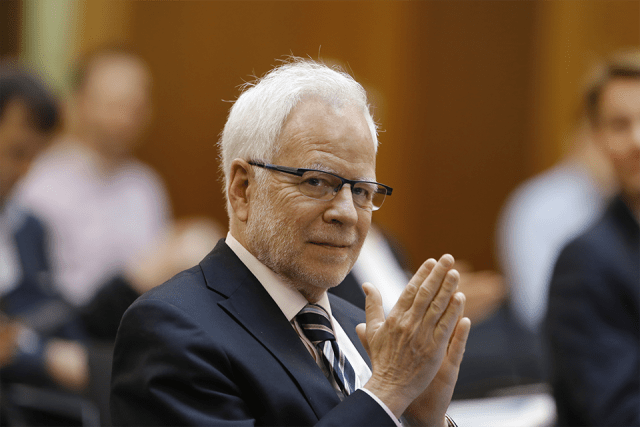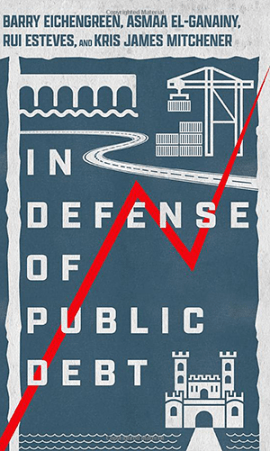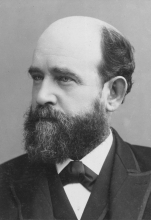
Photo By: UC Berkeley
In an uncertain economic environment, the future of the US dollar as the world’s leading international reserve currency was at the heart of the semiannual Henry George Lecture at The Peter J. Tobin College of Business at St. John’s University on Thursday, October 27.
Barry Eichengreen, Ph.D., the George C. Pardee and Helen N. Pardee Chair and Distinguished Professor of Economics, and a professor of political science at the University of California, Berkeley, was welcomed by an enthusiastic audience of St. John’s students, faculty, administrators, staff, and guests, delivering a virtual lecture on the dollar and the potential rise of other lead currencies.
Dr. Eichengreen’s conclusion: Don’t expect a replacement reserve currency any time soon.
“The dollar’s dominance will erode, at best, only very slowly,” he said. “I don’t think it will be toppled anytime soon, but small currencies could continue to nibble at the dollar along the edges.”
Dr. Eichengreen is also a research associate at the National Bureau of Economic Research and a research fellow at the Centre for Economic Policy Research. From 1997 to 1998, he was a senior policy adviser at the International Monetary Fund.

He is a recognized expert in economic history and monetary economics, and his most recent book, In Defense of Public Debt, published in 2021 and cowritten with economists Asmaa El-Ganainy, Rui Esteves, and Kris James Mitchener, pushes back against mainstream accounts warning of the negative consequences of public debt issuance.
In his hourlong discussion with the St. John’s community, Dr. Eichengreen said that while the US dollar is less essential now than previously to global transactions, neither emerging currencies nor cryptocurrencies provide the baseline stability of the dollar. The lecture is available online.
“China, for example, suffers from a lack of transactional infrastructure,” Dr. Eichengreen said. “It also has capital control and governance control issues. Cryptocurrencies are too volatile to substitute for payments and are not stable.”

Since 1981, the Henry George Lecture Series has welcomed thought leaders to St. John’s to explore key issues in economics. It pays tribute to Mr. George (1839–97), a 19th-century American political economist who advocated for progress, free trade, and social development.
The Henry George Chair is an endowed position at St. John’s created in 1981 with a grant from the Robert Schalkenbach Foundation. Aleksandr V. Gevorkyan, Ph.D., Associate Professor, Economics and Finance, has held the Henry George Chair since 2019. In 2019, Dr. Gevorkyan published a review of Dr. Eichengreen’s 2018 book, How Global Currencies Work: Past, Present, and Future (Princeton University Press), cowritten with Arnaud Mehl and Livia Chitu.
Mr. George’s ideas—laid out in his signature work, 1879’s Progress and Poverty—include the single-land-tax proposal, for which he is most famous. But according to Dr. Gervorkyan, his genius was to bring into popular discussion some of the difficult topics of his era that resonate in society today. As income inequality worsened at the dawn of the Progressive Era, Mr. George appealed to the ideas of common good and justice in a society where the government would act to minimize structural obstacles to individual progress. Dr. Gevorkyan said Mr. George’s influence on economic thought continues to this day.
“Problems of small-business growth, efficient public transportation systems, regulation of natural monopolies, use of urban space, the economic role of the government, monetary policy, sustainable economic development, and a great many other questions continue to influence our teaching and applied research,” Dr. Gevorkyan said.
Since its inception, the Henry George Lecture Series has featured 11 winners of the Nobel Prize in Economic Sciences. “The Henry George Lecture series at the Tobin College of Business contributes to the expansion of frontiers of knowledge on a range of issues in public and economic policy, economic development, and global economy trends,” Dr. Gevorkyan said.
Related News
Pharm.D. Candidate Earns National CVS Health/AACP Community Pharmacy Award
Last semester, Kharissa Seepersaud, a Pharm.D. candidate in the College of Pharmacy and Health Sciences , and a native of Ghana, was selected as a recipient of the 2025 CVS Health/ AACP Community...
St. John’s Joins National Network to Empower Catholic Leaders
St. John’s College of Liberal Arts and Sciences at St. John’s University is joining a network of 16 Catholic colleges and universities in a grant-funded effort to strengthen listening, dialogue, and...
Q&A with Alicia Calabrese ’94SJC., LEAD Honoree
Alicia Calabrese ’94SJC, Principal of Floral Park Memorial High School, will be among several alumni honored by The School of Education (TSOE) at the 15th Annual Leaders in Education Awards Dinner...
